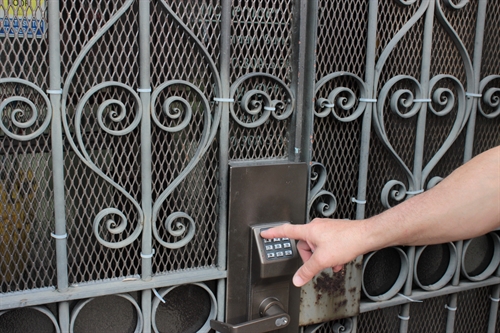If you’re used to securing your self-storage locker with a key, the thought of changing to a room with PIN code access might be daunting. But there are many advantages to electronically accessed storage, as long as you remember a few simple pointers.
Why would I want self-storage with electronic access?
Providing an electronic access system allows the storage company to offer 24-hour opening at a reasonable price. If you work full time, you may not be able to get to your storage unit during business hours so 24-hour access will make your life much easier.
Another benefit of domestic storage that is accessed by PIN code is that you can easily give a friend, relative or removal company access to your unit. You don’t have to meet up first to hand over a keym and then get it back. They can just show up, punch in the code and do whatever is needed in your storage unit, whether it’s inspecting your goods, adding more things or taking something out of storage.
Electronic access allows the storage company to run a more efficient building because they can easily turn off lights that are not needed. Electronic opening and closing of doors also lets the company maintain a controlled climate more easily. As well as being less harmful for the environment, these efficiencies will ultimately be reflected in your storage bill.
What are the rules for storage with access codes?
Every self-storage company will have its own rules about PIN codes. These will form part of your contract with the storage company, so it’s important to read them and get to know them. Sticking to the rules will help to keep your storage unit secure, and will ensure that you can get access when you need it.
Look after your self-storage access number
Your self-storage access code will allow you to enter the storage building, and your own lock-up. If you share that number with other people, they can access your stored goods. It may be that you have to give access to a relative or to a removal company, and that’s quite reasonable. But once they’ve finished moving items into or out of your storage unit, ask your storage company to give you a new access code. Most storage companies will be happy to do this as many times as you need, and some may even allow you to change your own PIN via their app or on their website.
Learn your self-storage PIN code to keep it safe
If you can, commit your storage access number to memory – the Memory Institute has some tips about learning numbers by heart. But if you need to write it down, do it in a way that is only useful to you. For example, write down the address and number of your lock-up in one place, and the access code in another.
Always key in your code, even if the door is open
Modern storage companies have complex security arrangements, and when you key your PIN into the pad by the entrance, you are doing more than just unlocking the door. You may also be switching on lights and deactivating alarms. If you follow another customer or a member of staff through an open door, you may find that you do not have access to the parts of the building that you need, or you might set off an alarm. So always take time to punch in your numbers when you arrive at the storage centre.
Shut the door after you when accessing your storage unit
Once you have passed through the access doors to the storage building, make sure they close behind you.
This is a breach of normal good manners, but storage companies will ask you not to hold doors open for people behind you. This is a security measure, to prevent people who should not be in the storage centre from gaining access. No-one who is there with good intent will mind keying in their code at the door, and as mentioned above, they may need to do it to ensure they can access their own storage room without setting off alarms.
Don’t prop open doors at a storage centre
Many people feel nervous in confined spaces, particularly if they are a bit isolated, as storage units can be. While you are having a rummage in your storage unit, it’s usually fine to keep the shutter open. But storage companies often have a rule against propping open access doors in the corridor. Even if you’re moving your stuff in and out, adhere to this, as it is for your own safety and to protect your stored domestic items. Doors play a part in fire safety, as well as security, and they can’t do their job if they are propped open.
Report any problems with automatic doors at a storage unit
Good quality storage companies will check their facilities frequently, but it’s helpful to report any problems you spot. If a door does not open or close properly, let the staff on reception know, or use any reporting mechanisms offered to you on the storage company’s website.
Should I get insurance if my storage company has electronic access?
Code access to a storage unit has many advantages, but it is likely that you will still have to have insurance for your self-storage. This will be a condition of your contract with the storage company – but if you feel you are paying too much each month, get a quick quote from Store and Insure to make sure you are getting best value.
Want to know more about personal security at your storage unit? We’ve got a blog post for that!
Photo by Danielle Rice on Unsplash



